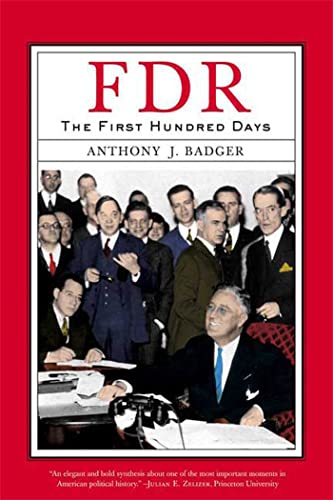
Inhaltsangabe
The Hundred Days, Franklin Roosevelt's first fifteen weeks in office, have become the stuff of legend, a mythic yardstick against which every subsequent American president has felt obliged to measure himself. The renowned historian Anthony J. Badger cuts through decades of politicized history to provide a succinct, balanced, and timely reminder that Roosevelt's accomplishment was above all else an exercise in exceptional political craftsmanship.
Roosevelt entered the White House in 1933 confronting 25 percent unemployment, bank closings, and a nationwide crisis in confidence. From March 9 to June 16, FDR secured sixteen major bills, many of which gave extraordinary discretionary power to the president. From legalizing the sale of beer to providing mortgage relief to millions of Americans, Roosevelt launched the New Deal that conservatives have been working to roll back ever since. Reintroducing the contingency that marked those fateful days, Badger humanizes Roosevelt and suggests a far more useful yardstick for future presidents: the politics of the possible under the guidance of principle.
Die Inhaltsangabe kann sich auf eine andere Ausgabe dieses Titels beziehen.
Über die Autorin bzw. den Autor
Anthony J. Badger
Auszug. © Genehmigter Nachdruck. Alle Rechte vorbehalten.
FDR: The First Hundred Days
By Anthony J. BadgerHill and Wang
Copyright © 2009 Anthony J. BadgerAll right reserved.
ISBN: 9780809015603
„Über diesen Titel“ kann sich auf eine andere Ausgabe dieses Titels beziehen.
Weitere beliebte Ausgaben desselben Titels
Suchergebnisse für FDR: The First Hundred Days (Critical Issue)
FDR: The First Hundred Days (Critical Issue)
Anbieter: World of Books (was SecondSale), Montgomery, IL, USA
Zustand: Good. Item in good condition. Textbooks may not include supplemental items i.e. CDs, access codes etc. Bestandsnummer des Verkäufers 00090394778
Gebraucht kaufen
Versand innerhalb von USA
Anzahl: 2 verfügbar
FDR: The First Hundred Days (Critical Issue)
Anbieter: BooksRun, Philadelphia, PA, USA
Paperback. Zustand: Fair. First Edition. The item might be beaten up but readable. May contain markings or highlighting, as well as stains, bent corners, or any other major defect, but the text is not obscured in any way. Bestandsnummer des Verkäufers 0809015609-7-1-13
Gebraucht kaufen
Versand innerhalb von USA
Anzahl: 1 verfügbar
Fdr: The First Hundred Days
Anbieter: ThriftBooks-Atlanta, AUSTELL, GA, USA
Paperback. Zustand: Good. No Jacket. Pages can have notes/highlighting. Spine may show signs of wear. ~ ThriftBooks: Read More, Spend Less. Bestandsnummer des Verkäufers G0809015609I3N00
Gebraucht kaufen
Versand innerhalb von USA
Anzahl: 1 verfügbar
Fdr: The First Hundred Days
Anbieter: ThriftBooks-Phoenix, Phoenix, AZ, USA
Paperback. Zustand: Very Good. No Jacket. May have limited writing in cover pages. Pages are unmarked. ~ ThriftBooks: Read More, Spend Less. Bestandsnummer des Verkäufers G0809015609I4N00
Gebraucht kaufen
Versand innerhalb von USA
Anzahl: 1 verfügbar
Fdr: The First Hundred Days
Anbieter: ThriftBooks-Reno, Reno, NV, USA
Paperback. Zustand: Very Good. No Jacket. May have limited writing in cover pages. Pages are unmarked. ~ ThriftBooks: Read More, Spend Less. Bestandsnummer des Verkäufers G0809015609I4N00
Gebraucht kaufen
Versand innerhalb von USA
Anzahl: 1 verfügbar
Fdr: The First Hundred Days
Anbieter: ThriftBooks-Dallas, Dallas, TX, USA
Paperback. Zustand: Good. No Jacket. Pages can have notes/highlighting. Spine may show signs of wear. ~ ThriftBooks: Read More, Spend Less. Bestandsnummer des Verkäufers G0809015609I3N00
Gebraucht kaufen
Versand innerhalb von USA
Anzahl: 1 verfügbar
Fdr: The First Hundred Days
Anbieter: ThriftBooks-Atlanta, AUSTELL, GA, USA
Paperback. Zustand: Very Good. No Jacket. May have limited writing in cover pages. Pages are unmarked. ~ ThriftBooks: Read More, Spend Less. Bestandsnummer des Verkäufers G0809015609I4N00
Gebraucht kaufen
Versand innerhalb von USA
Anzahl: 2 verfügbar
Fdr: The First Hundred Days
Anbieter: ThriftBooks-Dallas, Dallas, TX, USA
Paperback. Zustand: Very Good. No Jacket. May have limited writing in cover pages. Pages are unmarked. ~ ThriftBooks: Read More, Spend Less. Bestandsnummer des Verkäufers G0809015609I4N00
Gebraucht kaufen
Versand innerhalb von USA
Anzahl: 1 verfügbar
FDR: The First Hundred Days (Critical Issue)
Anbieter: Blue Vase Books, Interlochen, MI, USA
Zustand: acceptable. The item is very worn but is perfectly usable. Signs of wear can include aesthetic issues such as scratches, dents, worn and creased covers, folded page corners and minor liquid stains. All pages and the cover are intact, but the dust cover may be missing. Pages may include moderate to heavy amount of notes and highlighting, but the text is not obscured or unreadable. Page edges may have foxing age related spots and browning . May NOT include discs, access code or other supplemental materials. Bestandsnummer des Verkäufers BVV.0809015609.A
Gebraucht kaufen
Versand innerhalb von USA
Anzahl: 1 verfügbar
FDR: the First Hundred Days
Anbieter: Better World Books: West, Reno, NV, USA
Zustand: Very Good. Former library copy. Pages intact with possible writing/highlighting. Binding strong with minor wear. Dust jackets/supplements may not be included. Includes library markings. Stock photo provided. Product includes identifying sticker. Better World Books: Buy Books. Do Good. Bestandsnummer des Verkäufers 7886914-6
Gebraucht kaufen
Versand innerhalb von USA
Anzahl: 1 verfügbar


